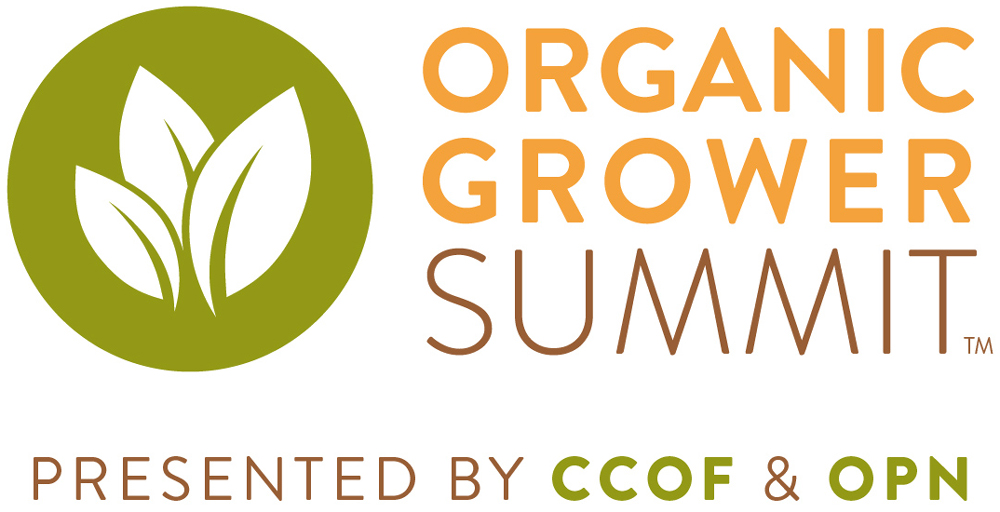Largely unnoticed by the organic produce industry, one of the largest---and most important---efforts ever to raise funds for organic research and promotion is becoming more visible. OPN is taking a look at the USDA marketing order impacting organic fresh fruit and vegetable producers, handlers and retailers.
Today is Part I of an overview of the GRO Organic Program.
What Is GRO Organic?
The Organic Trade Association, in collaboration with the GRO Organic Core Committee, has formally petitioned the U.S. Department of Agriculture (USDA) for a research and promotion check-off program for organic products, including fresh produce, dairy, meat, grain and processed organic foods (wines, for example). Under the GRO order, growers, handlers and importers of organic products will be assessed a fee and pool these resources to conduct research and promotion activities.
If Approved, What Organic Products Will Be Assessed?
All certified organic products will be assessed including a range of agricultural commodities, such as fruits, vegetables, dairy, meat, poultry, breads, grains, snack foods, condiments, beverages and packaged-and-prepared foods. Non-food items (textiles, personal-care products, pet food, flowers, etc.) will also be assessed.
How Much Will a Company Be Assessed?
A company will be assessed one-tenth of one percent of net sale of organic product:
- for growers, organic feed, seed and planting stock: total gross sales minus cost
- for processors: the cost of certified organic ingredients
What is an Example of How Much One-tenth of One Percent Is?
If a company’s sales equal $100,000 in net organic products, you’ll be assessed $100. If sales equal $1,000,000 in net organic products, the assessment will be $1,000.
Who Pays the Assessment?
The assessment is mandatory unless the company meets one of the exemptions.
Who is Exempt from the Assessment?
- producers with gross organic sales of $250,000 or less for the prior marketing year
- handlers with gross organic sales of $250,000 or less for the prior marketing year
- importers with $250,000 or less in transaction value of imported organic products for the prior marketing year
- Organic products exported from the U.S.
What if a Company is Currently Assessed by Another Marketing Order?
A company can claim an exemption for its organic product from paying assessments to existing Research & Promotion (R&P) marketing orders. If the GRO Organic assessment is passed through referendum, the exemption will go away and no longer apply.
If a company that grows or handles organic product has an existing R&P order, the company will be able to choose whether to pay the assessment for the current commodity R&P marketing order or to the GRO Organic marketing order.
A Company is assessed by its State Commodity Promotional Program — How is that Handled?
The company will still owe the state/regional assessment. The GRO Organic Proposal includes a provision to offset part of what you pay to a state promotion assessment. Section 1255.54 states that the Board, with approval of the Secretary, can credit an organic producer or handler up to 25 percent of the amount to GRO Organic to “offset collection and compliance costs relating to such assessments and for fees paid to Qualified State Commodity Boards required by State law.”
The offset will only be for monies that go to research and promotional programs; not for dues or quality specifications.
What’s an Example of a Company Being Assessed by its State Commodity Promotional Program and How it is Impacted by the GRO Program?
For example, an organic potato grower in Idaho was required to pay the Idaho state program $30 each year. If GRO Organic is passed, the Idaho grower is assessed $100 by the new program. In this scenario, the grower can offset 25 percent ($25 of the $100 to GRO Organic) so the grower pays $75 to GRO Organic and $30 to the state program.
The grower can offset 25 percent of what he pays the state to GRO Organic, but not 100 percent.
What Commodities Have Existing Research & Promotion Marketing Orders?
What Commodities Have Existing State/Regional Commodity Orders?
What Can Stakeholders Do?
Your voice counts as to whether GRO Organic moves forward. The deadline for comments to USDA has just been extended from March 20 until April 19! As of mid-February, USDA had received 1,656 comments on their website about the assessment. Ninety-seven percent of these comments are from consumers. Only three percent are from growers and only one is from a retailer. Your comments---pro or con-- are important.
YOUR VOICE COUNTS! Visit www.regulations.gov to provide your comments directly to USDA about the proposed GRO Organic Assessment.
Look for Part II next week.
Sources: www.federalregister.gov; www.OTA.com; www.ams.USDA.gov







 OPN Connect is pleased to introduce our first contributor, Melody Meyer, vice president of corporate social responsibility, policy and industry relations for United Natural Foods Inc. (UNFI). Melody has been in the organic food industry since 1976 and is a founding member of the Alliance of Organic Food Funders and an active member of Sustainable Agriculture and Food Systems Funders.
OPN Connect is pleased to introduce our first contributor, Melody Meyer, vice president of corporate social responsibility, policy and industry relations for United Natural Foods Inc. (UNFI). Melody has been in the organic food industry since 1976 and is a founding member of the Alliance of Organic Food Funders and an active member of Sustainable Agriculture and Food Systems Funders.